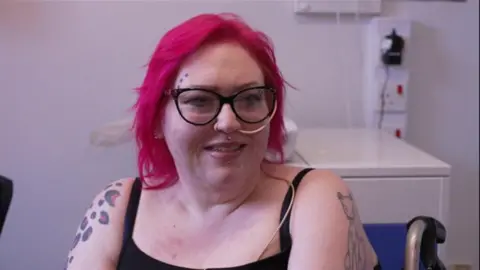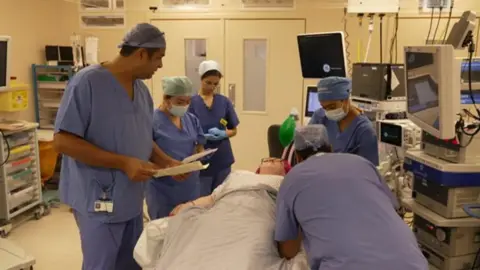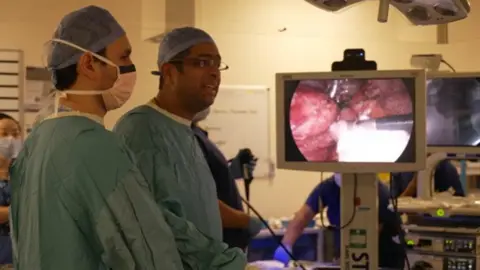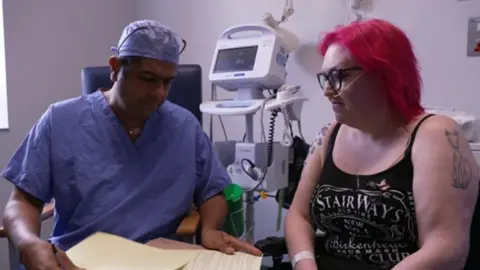Woman's three-year food nightmare after botched op
 BBC
BBCA woman may be able to eat for the first time in three years after surgeons corrected a weight loss operation carried out in Turkey.
Pinky Jolley almost died twice from infection following the botched procedure, which left a ball of concretised pus inside her.
Lead surgeon Prof Rishi Singhal, at Solihull Hospital, had to release her colon, liver and spleen which were stuck and out of position.
It is believed that treating Ms Jolley has cost the NHS more than £100,000 after she paid to have the private procedure abroad.

In November 2022, Ms Jolley, who is disabled, paid £2,100 to have a gastric sleeve operation in Turkey.
Her weight had increased to 17 stone 11lbs (112kg), but she was unable to afford private surgery in the UK, which carries an average cost of about £10,000.
Bariatric surgeons have claimed that the NHS is not doing enough surgery to meet demand.
Ms Jolley said: "In the end it will be resolved, but it has been such a hard slog and I nearly lost my life several times.
"I don't regret having a surgery but I do regret choosing where I had my surgery."
After three years without solid food, she said she was most looking forward to eating garlic, mushrooms and cheese.

The operation involved taking away the pouch part of her stomach and leaving a sleeve which helps with weight loss.
There was a significant leak and Ms Jolley, from the Wirral, had to have her stomach the equivalent of "jet washed" to save her life.
She then spent three months on intravenous antibiotics, but since then, can only be fed liquid through a tube in her nose. Surgeons had told her that there was nothing more they could do for her.
Prof Singhal and his team from University Hospitals Birmingham agreed to attempt a by-pass operation, creating a small pouch from the top end of her stomach and attaching it to her small bowel.
“This is normally routine surgery but because of the state of her insides, on a scale of one to 10, this is an 11," Prof Singhal said.
"Surgeons elsewhere in the NHS have declined to do it. We have to try to avoid the septic mass - if we cut into it, then she could become septic very quickly and die."
Ms Jolley was made aware that she could die on the operating table, but she said that she could not carry on living like this.

"I know that it won’t correct everything and it won’t be a cure, but I will be able to eat again. I will be able to go out with friends, to have a life," she said.
During the operation, Prof Singhal described dissecting the top end of the stomach as "like cutting through concrete" because it had become so thick from leaks and bleeds that it could not be achieved with standard equipment.
Bariatric surgeons at University Hospitals Birmingham NHS Foundation Trust have become increasingly worried about the number of seriously ill patients coming from Turkey that they have had to treat.
They said they regularly had to cancel patients on their waiting lists who are in need of surgery to sort out life-threatening mistakes.
Follow BBC Birmingham on Facebook, X and Instagram. Send your story ideas to: [email protected]
